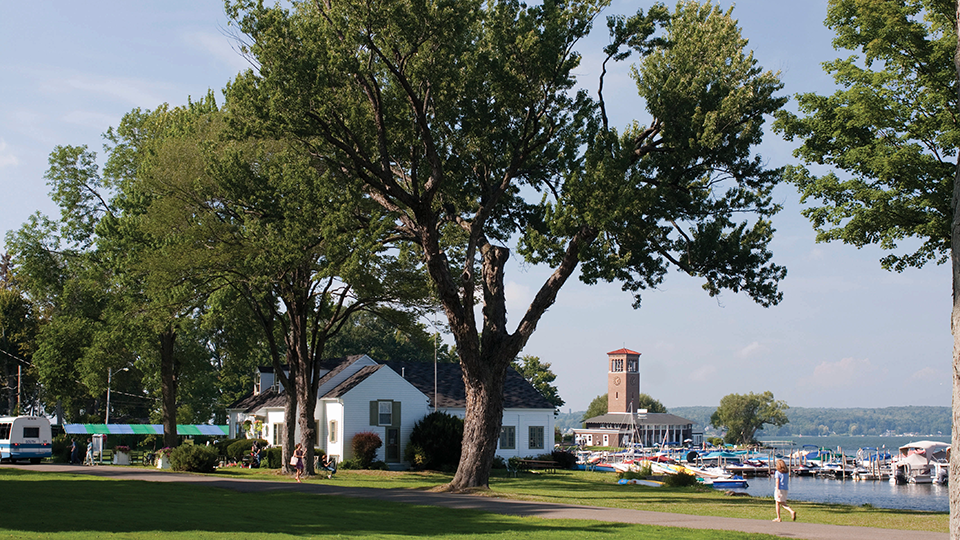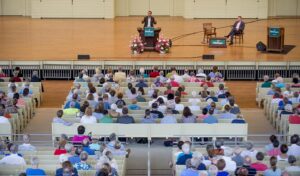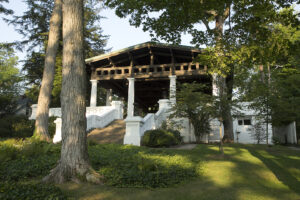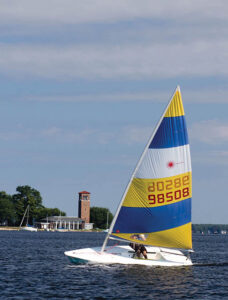
After 150 years, Chautauqua Institution still holds strong in its mission of continuing education
By Meredith Lehman
Photos courtesy of Chautauqua Institution
On Aug. 12, 2022, Chautauqua Institution in rural southwestern New York made headlines. World-renowned author Salman Rushdie was giving the morning lecture at the Chautauqua Amphitheater when an audience member rushed the stage and stabbed Rushdie more than a dozen times, instantly threatening the freedom of expression that has been the institution’s cornerstone for 150 years.
Rushdie, now blind in one eye, has recovered, and the institution has moved forward. As it prepares to celebrate its sesquicentennial this year, it still stands unwavering in its commitment to protecting its mission to explore the best in human value.
I’ve always found it difficult to define Chautauqua Institution, but there is a single word that always comes to mind when I try to describe the 750-acre community: home. It’s not my permanent home where I grew up and went to school, but I’ve visited every summer for the last 25 years, and every time I return, it feels as if nothing has changed.
As a fifth-generation Chautauquan, my love for this lakeside community has been ingrained in my DNA since birth. But it’s the enchantment of Chautauqua that has stayed with me from childhood into adulthood, drawing me back year after year.
While the beautiful summer weather and the extreme warmness of everyone alone would be enough to keep me coming back, it’s the inherent feelings of belonging and acceptance I’ve felt since I first stepped — or rather crawled — onto the grounds.
Founded in 1874, Chautauqua Institution was established as an experiment focusing on out-of-school education for Sunday School teachers. Over time, it expanded to include subjects such as physical education, music and art. Today, the institution has four pillars — education, arts, religion and recreation — and uses these as guidance when planning the nine-week season lasting from late June to late August.
EDUCATION

The daily morning lecture takes place in the Chautauqua Amphitheater and focuses on the week’s theme.
Each week during the nine-week season is centered around a specific theme. The upcoming season features themes such as “The AI Revolution,” “What We Got Wrong: Learning from Our Mistakes,” and “Water: Crisis, Beauty and Necessity — A Week in Partnership with National Geographic.” The programming is guided by the theme of the week, and experts are invited to speak and cover a wide range of topics, including political discourse and cultural and social issues.
The Chautauqua lecture platform includes a morning lecture; afternoon interfaith lecture; Chautauqua Literary and Scientific Circle, a book club founded in 1878; and other special presentations.
The lineup of lecturers usually includes prominent figures from various fields — politicians, professors, authors and religious leaders. Historical speakers have included notable figures like President Franklin D. Roosevelt, who delivered his “I Hate War” speech there in August 1936, and Susan B. Anthony, who championed women’s rights from the amphitheater stage. More recent speakers have included filmmaker Ken Burns and author Jon Meacham; Meacham will speak again during Week One of the upcoming season. The week’s theme is “The Evolution of the Modern Presidency.”
Apart from the many lectures, there are classes designed for youth and adults to acquire new skills or understand new ideas. These classes encompass a broad spectrum of subjects, including art, music, photography, culinary arts, religion, philosophy, fitness, dance, history, literature and writing, providing ample opportunities for Chautauquans to learn something new every summer.
THE ARTS
Chautauqua provides learning opportunities to patrons and students from around the world. The institution offers resident programs in various fine arts subjects through its renowned Music Festival, Chautauqua Theater Co., Chautauqua Opera Co. and Conservatory, Music School Festival Orchestra, Chautauqua Symphony Orchestra, School of Art, Chautauqua School of Dance and on-grounds galleries. Many of these programs are internationally recognized and showcase the upcoming generation of artists.
The resident programs offer a unique opportunity for emerging artists to train alongside experienced professionals. This combination creates a vibrant environment that fosters creativity and innovation in the arts. The Chautauqua Opera Co.’s Young Artist Program accommodates 24 artists, while the Chautauqua Theater Co. provides a platform for new American plays, and the School of Art hosts two residents during the season. The variety of arts available on the grounds offers patrons a well-rounded experience, particularly during collaborations across companies. The Chautauqua Symphony Orchestra, comprising musicians from around the world, frequently collaborates with dance or opera students to perform, providing additional opportunities to learn from experts.
RELIGION

The Hall of Philosophy is the setting for the daily interfaith lecture given at 2 p.m. Monday through Friday during the season.
While Chautauqua has a Christian heritage, it also has a strong commitment to ecumenism and interfaith cooperation. The institution hosts a wide variety of daily worship services. Those include the largest — Sunday morning’s nondenominational worship services — and the Sacred Song Service on Sunday evenings, a tradition that dates back nine generations.
Numerous denominational houses and religious organizations offer programming throughout the season. There are 12 denominational houses on the grounds, including Baptist, Roman Catholic, Christian Science, Disciples of Christ, Episcopal, Orthodox Jewish, Lutheran, Presbyterian, Quaker, United Church of Christ, United Methodist and Unitarian Universalist Fellowship.
RECREATION
There are countless ways to get involved with recreation at Chautauqua, ranging from a youth day camp to water sports to clubs to events.
The Chautauqua Boys’ and Girls’ Club, referred to as “Club,” is the oldest day camp in the country. It is open to children entering grades second through tenth and operates as an almost full-day camp, with a break from noon to 2 p.m. for lunch. The camp offers a variety of educational and recreational activities, including sailing, kayaking, swimming, field activities, crafts, music, nature and sports. Some of the best summers of my life were spent at Club — sailing and playing kickball in the morning and learning to juggle and weave lanyards in the afternoon. For those younger than second grade, there is Children’s School, a nursery school for kids ages 2 to 5 that teaches a themed curriculum each week of the season.

Sailing on Lake Chautauqua is one of many recreational activities available on the grounds.
While the kids play at Children’s School and Club, there are plenty of activities to keep adults occupied as well. You can rent a kayak from the Chautauqua Sports Club, play a round of golf at the Chautauqua Golf Club, visit the Miller Bell Tower on the lake, see a movie at the Chautauqua Cinema, attend an event at the Chautauqua Women’s Club, go on a walk with the Bird, Tree and Garden Club, or attend a musical performance at the amphitheater or one of the School of Music’s recital halls. My favorite activity is strolling down to the Children’s Beach and finding a nice spot in the sand to relax with a good book.
If you’re in the mood to explore, be sure to visit Bestor Plaza. Along the north side of the plaza is the colonnade, which houses administrative offices, shops with pieces from local artists and a small market.
Along the west side, there are houses where patrons stay; the office of The Chautauquan Daily, the official newspaper of Chautauqua Institution, published daily during the season; and even the St. Elmo Spa, which offers spa services from manicures to massages and facials.
Along the east side is the bookstore, the post office and the Brick Walk Cafe. The bookstore has trinkets, clothing, souvenirs and, of course, books. The Brick Walk Cafe is the go-to lunch spot for Chautauquans. And don’t miss out on their ice cream.
“There’s no place like [Chautauqua Institution],” the author David McCullough once said. “No resort. No spa. It is at once a summer encampment and a small town, a college campus, an arts colony, a music festival, a religious retreat and the village square. There’s no place — no place — with anything like its history.”
And I agree — there’s no place like home.
THE DETAILS
To learn more about Chauatuqua Institution, visit chq.org.
